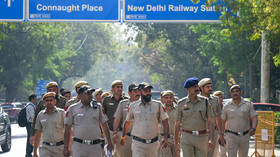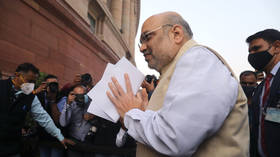First arrest made in India under new criminal laws

A street vendor has been arrested in the Indian capital for “obstructing a footbridge” at a railway station under the country’s new criminal code, which came into force on Monday.
Pankaj Kumar was selling tobacco and water when police asked him to move his cart. He ignored their requests, Indian media reported, and a case was registered under Section 285 of the newly implemented legislation.
India is now enforcing three new sets of laws, replacing the colonial-era Indian Penal Code of 1860, Code of Criminal Procedure of 1973, and the Indian Evidence Act of 1872 respectively. The laws were enacted earlier this year after being passed by both houses of Parliament last December.
The move is widely seen as an attempt by Narendra Modi’s government to part with the country’s colonial past and modernize India’s criminal justice system, with a focus on national security and protecting women and minors.
Notably, the Bharatiya Nyaya Sanhita (Indian Penal Code) defines “terrorism” and makes it punishable with the death penalty or life imprisonment without parole.
The new statutes will prioritize punishing crimes against women and children, Indian Union Minister Amit Shah asserted on Monday. “Gang rape will attract 20-year imprisonment or life imprisonment, and rape of a minor will attract the death penalty. A separate crime has been defined for sexual exploitation by hiding one’s identity or making false promises,” he said.
Meanwhile, over 45,000 police in Delhi have been trained to use the new code ahead of its implementation, Delhi Police Special Commissioner Chhaya Sharma told news agency ANI. The government has prepared “special booklets” to inform officials about the changes, she said. Posters educating people about the new laws have been put up at several locations across the city.
The Indian opposition, however, has called for a re-examination of the new laws, arguing they were passed hastily while over 140 MPs were suspended due to their demands to debate a security breach in Parliament.
“INDIA will no longer allow this ‘bulldozer justice’ to prevail in the parliamentary system,” Mallikarjun Kharge, president of the Congress Party, which leads the opposition Indian National Developmental Inclusive Alliance (INDIA) bloc, posted on X (formerly Twitter).
The opposition has previously raised concerns over several sections of the new code, including on sedition and anti-terrorism, arguing that the revised statutes are more “draconian” than those adopted under British rule. Former Finance Minister P. Chidambaram, a prominent Congress leader, claimed that 90-99% of the new laws are a “cut, copy and paste job” and some changes were “prima facie unconstitutional.”
The home minister, however, has repeatedly insisted that the updated code is not intended to “punish, but give justice.”
Where India Meets Russia: Follow and share RT India on X and Instagram













